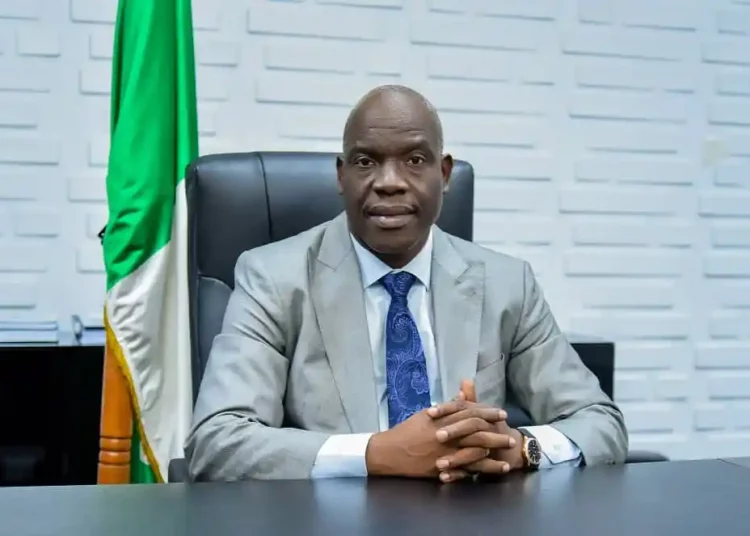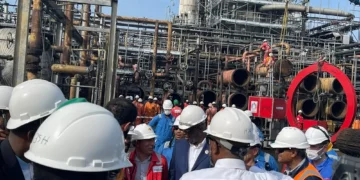The Nigerian Upstream Petroleum Regulatory Commission (NUPRC), said the Petroleum Industry Act (PIA) had introduced incentives to grow reserves.
The commission also said that the aim of the Act was to increase Nigeria’s daily production toward attaining 40 billion barrels and 220TCF of oil and gas reserves.
This is as the Nigeria Liquified Natural Gas (NLNG) Ltd has raised concern that increasing oil theft and asset breach is currently causing huge production decline from its plant.
Statistics from the firm indicates that the plant located in Bonny Island of Rivers State is producing at up to 68 per cent of its capacity due to theft of crude oil and vandalism of pipelines, among other problems.
The commission said the incentives would also enable the country attain production target of three million barrel per day (3mb/d).
Mr Gbenga Komolafe, the Commission Chief Executive (CCE) NUPRC, spoke on Wednesday in Abuja at the ongoing 21st Nigerian Oil and Gas Conference and Exhibition, tagged “Funding the Nigerian Energy Mix for Sustainable Economic Growth.’’
Komolafe spoke on “Providing Regulatory Oversight in the Petroleum Industry Act (PIA) Era”.
He said that Nigerians craved a legal regulatory framework for the oil and gas industry, one robust enough to effectively regulate the sector for optimum productivity and efficiency.
Komolafe thanked President Muhammadu Buhari and the Ninth Assembly for the PIA passage.
He said it provided for administrative, institutional governance, attractive fiscal regimes, mechanisms for improved environment and peaceful co-existence between operators and host communities.
According to him the act empowers the commission on technical and commercial regulation of the Upstream Petroleum activities in a manner to ensure sustainable hydrocarbon exploration and production at optimum cost.
He said the act also dealt on issues of environmental remediation, decommissioning, and abandonment, and setting up of Host Community Development Trust (HCDT).
Komolafe said that the sixth schedule of the act provided for production allowance wherein performance in terms of production milestone was rewarded.
He said it introduced a mandatory Decommissioning and Abandonment Fund prescribed under Section 232 and 233, adoption of Grid System for Acreages under Section 69, HCDT under Chapter three which replaced MOUs and GMOUs.
These, he said were aimed at achieving operational efficiency, higher productivity, cost optimisation, cleaner and safe upstream environment.
According to him, the PIA 2021 under Chapter four and the seventh schedule provided attractive fiscal terms for the Petroleum Industry which included Progressive royalty rates compared to pre-PIA royalty rates for all terrains.
Others, he included are Reduced Royalties (to 2.5 per cent) for gas produced and utilised locally, introduction of hydrocarbon tax and company income tax that are cumulatively lower than Petroleum Profit Tax Pre-PIA
“Zero hydrocarbon tax for deep offshore operations, consolidated taxation on lease- and company-basis and other fiscal incentives.
“These sweeping reforms are geared toward creating additional opportunities for new investments and higher revenue for both government and investors,’’ he said.
Meanwhile, NLNG chief executive, Philip Mshelbila, theft and vandalism were gradually strangulating Nigeria’s oil and gas sector.
“We have been producing in the last month at about between 60 to 68 per cent utilisation. In other words, roughly 35 per cent of our capacity is empty,” Mshelbila disclosed at the ongoing Nigeria Oil and Gas Conference, NOG, in Abuja.
“There are many factors, but the biggest one of them is crude oil theft. If we don’t address this, we will not get out of this quagmire that we’re in,” Mshelbila said, adding that, his company had stopped exports of liquefied petroleum gas for domestic use to meet demand from the local market.
Nigeria’s petroleum regulator said last week the country lost $1 billion in revenue during the first quarter of this year due to crude oil theft, warning the practise was a threat to the economy of Africa’s top producer.
Nigeria LNG is a consortium between state-run Nigerian National Petroleum Corporation, Eni, TotalEnergies and Shell with a capacity of 22 million tonnes per year.
The NLNG has high ambitions for its latest project. The long-awaited expansion will increase production capacity by 35 per cent from 22 million tons per annum, 22mtpa to 30mtpa and enhance NLNG’s competitiveness in the global market.





